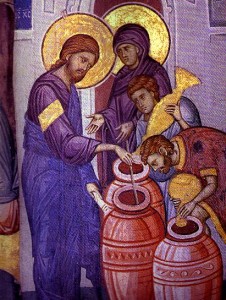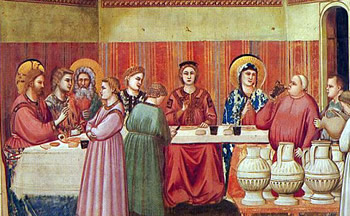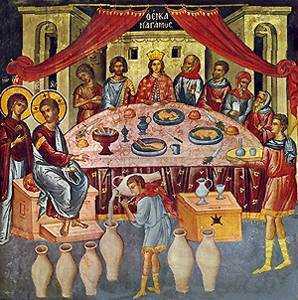Turning Water to Wine:
God's Excess and Extravagance
For Sunday January 20, 2013
Lectionary Readings (Revised Common Lectionary, Year C)
Isaiah 62:1–5
Psalm 36:5–10
1 Corinthians 12:1–11
John 2:1–11
In Scripture celebrations loom large as a way to describe how God relates to his people. Isaiah compares Israel's future to a wedding: "As a young man marries a maiden, so will your sons marry you; as a bridegroom rejoices over his bride, so will your God rejoice over you" (Isaiah 62:5). The psalmist describes a feast of abundance for "man and beast, both high and low" (36:7–8).
So too in the gospels. Jesus compares God's kingdom to "a king who prepared a wedding banquet for his son," only to have people make feeble excuses about why they couldn't come. The parable of the ten bridesmaids urges us to remain vigilant, like we do at life-changing events like weddings. Life in God's kingdom requires wedding etiquette, says Jesus: "When someone invites you to a wedding feast, do not take the place of honor, for a person more distinguished than you may have been invited." John describes the consummation of human history as a great wedding party.
 |
John says that Jesus did "many miraculous signs in the presence of his disciples." He also says that he doesn't include most of them in his gospel. The first "sign" was at a wedding at Cana in Galilee, about nine miles northwest of Jesus's hometown of Nazareth. To the embarrassment of the host, the wedding wine ran dry. With his mother Mary and his disciples present, Jesus filled six stone pots used by Jews for ritual washings with water (they had been empty), and then turned the water into wine.
Empty pots used for ritual purity overflowed with wine for profane celebration.
The miracle was one of quantity and quality. Each pot held twenty to thirty gallons, so the result was 150 gallons of wine, far beyond what the revelers could drink (and reminiscent of the extra food left over after the feeding of the 5,000). There's an inverse ratio here between the trivial problem of running out of wine at a wedding and the bizarre abundance of the solution. And whereas most hosts serve the best wine first when people will appreciate the quality, and cheaper wine later when no one can taste the difference, Jesus reversed this pattern by saving the best for last.
The God that Jesus revealed isn't a stern and stingy God. He's a God of lavish liberality, generosity and extravagance. He's like a manager who pays a worker a full day's wages for one hour of work. He's the God who asks Jonah if he's angry because he is generous to the pagan Ninevites. He's a father who welcomes home a wayward son with a ring, a robe, and a party.
In turning water to wine, Jesus offers us excess for our emptiness.
And when we in turn imitate the character of God, it should be with the same extravagant generosity to others — like Mary, who anointed the feet of Jesus with expensive perfume even though the disciples complained that it was a waste of money.
 |
The miracle at Cana reminds me of the Danish film Babette's Feast, which won a 1988 Academy Award for best foreign film. The story takes place in the late nineteenth century in a small fishing village on the dank and dreary Jutland coast of Denmark. Two sisters have given up their own ambitions to care for their father, an elderly pastor of a stern and tiny church. Their band of dour Christians learns the meaning of God's extravagance from a most unlikely source when a French refugee named Babette invades their small world. In a highly symbolic act, Babette, who was a famous chef in Paris, cooks the villagers a sumptuous feast. At first the pinched villagers can't allow themselves to enjoy such extravagance. But they loosen up and learn to accept celebration, excess, and abundance.
I've never witnessed a miracle, but I've wondered how I would respond if I thought I did. The vast majority of people who encountered Jesus never saw or experienced a miracle. But they heard about them. What did they make of them?
John recorded the "many miraculous signs" of Jesus in order to encourage faith in those who heard about them, even if they didn't witness them firsthand: "These are written that you may believe that Jesus is the Christ, the Son of God, and that by believing you may have life in his name." And that's what happened at Cana; John writes that the disciples "put their faith in him."
I can imagine myself falling into some crude superstition, becoming a gawker at spectacles, or disbelieving the miracle and the miracle-maker like those whom John describes (John 12:37).
The early believers weren't gullible about miracle stories. They rejected many reported miracles about Jesus as spurious, like the Infancy Gospel of Thomas (c. 140–170) in which Jesus curses a playground bully who consequently dies, then raises him to life with a spontaneous wish-prayer, and turns clay pots into flying birds. They exercised reticence and restraint.
As the prevalence of signs, wonders, and miracles waned in the decades after the apostles, some people taught that the age of miracles ended with the Revelation of John. Hippolytus (d. 235) said the Spirit now speaks not through miracles but through the canon of Scripture, the creeds, and the clergy.
The miracles of Jesus provoked controversy, division, disbelief, and sometimes authentic faith. When some people asked Jesus to perform a miracle to prove his authority, he rebuked them for even asking. He said that if they really wanted to believe there was more than enough evidence. A few pages after the miracle at Cana, Jesus responded brusquely to a Gentile military officer who begged Jesus to heal his sick son: "unless you people see miraculous signs and wonders you will never believe." Then he healed the boy anyhow. Even false prophets, Jesus warned, could perform miracles.
 |
Jesus wasn't an ancient David Blaine, some street magician doing tricks to wow curiosity seekers. Nor were his miracles merely missions of mercy or demonstrations of God's compassion for human suffering (although they were at least that). Rather, to understand his miracles meant to exercise faith in him who had performed them. His signs, wonders, works and healings forced a decision one way or another: "Believe the miracles, that you may learn and understand that the Father is in me, and I in the Father… Believe me when I say that I am in the Father and the Father is in me; or at least believe on the evidence of the miracles themselves."
With the first of his "many miraculous signs," Jesus revealed the character of an extravagantly generous God. Contrary to our contemporary hubris and condescension toward people of the past, that's no more unbelievable today than it was back then. To be sure, it was and is very strong wine.
For further reflection:
* Isaiah 64:1, "You did awesome things we did not expect."
* Ephesians 3:20–21, "Now to him who is able to do immeasurably more than all we ask or imagine, according to his power that is at work within us, to him be glory in the church and in Christ Jesus throughout all generations, for ever and ever!"
Image credits: (1) Golden Arrow by Tim Bartel; (2) EthicsDaily.com; and (3) Cacina: carry the gospel with you.





